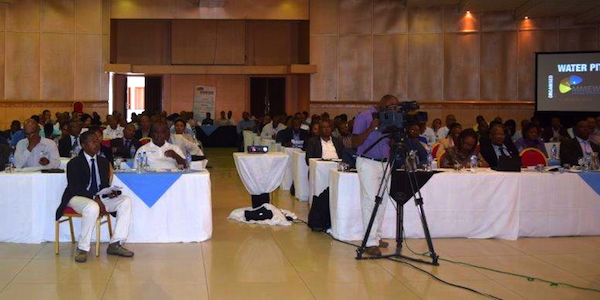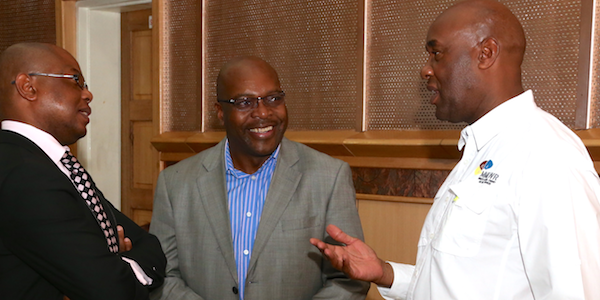Botswana’s Ministry of Minerals, Energy and Water Resources hosted 150 stakeholders March 19-20, 2015, at the annual ‘Water Pitso’ as part of a series of events to commemorate World Water Day. This year’s Pitso was themed “Sustainable interventions to address Botswana’s water challenges, in partnership with stakeholders,” and was held against the backdrop of a national water crisis, where for the first time in the history of the country, water rationing and restrictions have had a major impact on the capital city of Gaborone and its surrounding areas.
Pitso is the Setswana word for ‘consultation,’ which is an integral part of national culture, and took place in a ‘kgotla,’ or traditional setting. Much significance is placed on water in Botswana, a semi-arid country, and even the national currency, the pula, means rain.
The Pitso was held in Francistown, Botswana’s second largest city, and attended by local government authorities, Directors and CEOs of water resources and water services authorities, private sector representatives, and community leaders.
Botswana’s Minister of Minerals, Energy and Water Resources, Kitso Mokaila, officiated at the event. He said with "declining water resources and increasing demand for water, there is an urgent need to judiciously account for every drop that is available in Botswana." He called on civic and community leaders to help educate citizens about the importance of conserving water.
Mokaila said the ministry is implementing a project on water accounts with the Wealth Accounting and the Valuation of Ecosystems (WAVES) partnership to “assist the government to better manage its scarce resource.”
He said a draft national water and wastewater policy has been developed that provides direction for the planning, development and management of water resources. The policy has been approved by the Cabinet and is awaiting debate by Parliament.
Presentation on Water Accounts
A presentation on water accounts was made by George Thabeng, from the Department of Water Affairs.
Botswana’s water accounts are currently being updated with the latest available data from Statistics Botswana, and the Ministry of Minerals, Energy and Water Resoures. Much of Botswana’s economic growth and development has been driven by the mining sector, which contributes 25 percent of the country’s GDP, but uses 10 to 15 percent of its water—three quarters of which is for diamond production.
Although the government is keen to diversify the economy, the sector remains important for future economic growth and it is critical to assess what impact mining will have on water resources. The accounts have so far been able to assess trends and productivity of water use in mining.
The water accounts presentation also highlighted:
- There is a need to expand irrigation to adapt to climate change and increase food security in the country, which is highly dependent on food imports from neighbouring South Africa. Thabeng discussed the water conservation potential of drip irrigation, increasing the efficiency of available water resources, and the increased use of treated wastewater.
- Stakeholders have a crucial role to play in data management. It is important to have NCA-compliant data from organizations, and the support of the mining and other economic sectors. Outcomes from the water accounts are set to inform sectoral policies, the formulation of the country’s 11th National Development Plan (NDP 11) and Post Vision 2016.
- The suggestion to safeguard water for basic needs, ecological water requirements, and for strategic sectors. Thabeng said allocations for other competing water uses should be based on productivity indicators.


